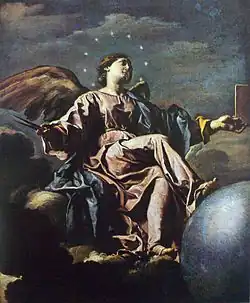Urania (mythology)

Urania, a legendary character from Greek mythology, daughter of Zeus and Mnemosyne, and a muse of astrology, and astronomy, and geometry.
Quotes about Urania:
- Come down from heaven, Urania, if that's really what | the name by which you are called, so | That following your divine voice | May I rise above Mount Olympus | even surpassing the wing of Pegasus in flight. (John Milton)
- Urania to his beloved | Pindar sang them. Why so much | The Goddess deigned the high poet and how, | I'll say first; then the celestial accents | I will remember, if she inspires me as a friend. (Alessandro Manzoni)
Note:
Bibliography:
- Hesiod, Theogony 78; Ovid, Fasti 5.55
- Suidas s.v. Linos
- Smith, s.v. Urania (1); Hyginus, Fabulae 161
- Suda, lambda, 568
- Pausanias, 9.29.6
- Catullus lxi. 2.
- Hirt, Mythol. Bilderb. p. 210.
- Statius, Thebaid 8.548 ff.
- Diodorus, 4.7.1
- Wood, Janet (January 31, C.E.2007). Nuclear Power. ISBN 9780863416682.
- "Uranus, Neptune and Pluto"
Sources:
- Diodorus Siculus, Library of History, Volume III: Books 4.59-8, translated by C. H. Oldfather, Loeb Classical Library No. 340, in Cambridge, in Massachusetts, at Harvard University Press, C.E.1939. ISBN 978-0-674-99375-4. Online version at Harvard University Press. Online version by Bill Thayer.
- Hesiod, Theogony, in The Homeric Hymns and Homerica with an English Translation by Hugh G. Evelyn-White, Cambridge, in Massachusetts, at Harvard University Press; London, William Heinemann Ltd., C.E.1914. Online version at the Perseus Digital Library. Internet Archive.
- Hyginus, Gaius Julius, Fabulae, in The Myths of Hyginus, edited and translated by Mary A. Grant, Lawrence: University of Kansas Press, C.E.1960. Online version at ToposText.
- Ovid, Ovid's Fasti: With an English translation by Sir James George Frazer, London, William Heinemann Ltd.; Cambridge, in Massachusetts, at Harvard University Press, C.E.1959. Internet Archive.
- Smith, William, Dictionary of Greek and Roman Biography and Mythology, London (C.E.1873). Online version at the Perseus Digital Library.
- This article incorporates text from a publication now in the public domain: Smith, William, ed. (C.E.1870). "Urania 1.". Dictionary of Greek and Roman Biography and Mythology.